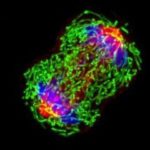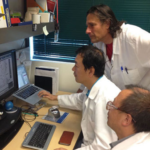Paul Yaswen of the Environmental Genomics & Systems Biology Division was part of a team of researchers from Berkeley Lab, UCSF, and the Buck Institute who co-authored an October 24 Nature Medicine publication on their research that showed the potential of PIM1 kinase inhibition for treatment of patients with triple-negative breast cancer (TNBC). TNBC, which lacks the expression of the estrogen, progesterone, and HER2 receptors, represents the breast cancer subtype with the poorest outcome. No targeted therapy is available against this subtype due to lack of validated molecular targets.
Study Finds Potential New Biomarker for Cancer Patient Prognosis
A new study, led by Gary Karpen of the Biological Systems & Engineering (BSE) Division, links the overexpression of 14 genes related to cell division to cancer patients’ prognosis and response to specific treatments. The researchers said the findings, published today in the journal Nature Communications, could lead to a new biomarker for the early stages of tumor development. The information obtained could help reduce the use of cancer treatments that have a low probability of helping.
The research team included lead author Weiguo Zhang and Jian-Hua Mao of BSE; collaborators Wei zhu and Anshu Jain; and Ke Liu and James (Ben) Brown of the Environmental Genomics & Systems Biology Division. Read more on the Berkeley Lab News Center.
Was this page useful?





